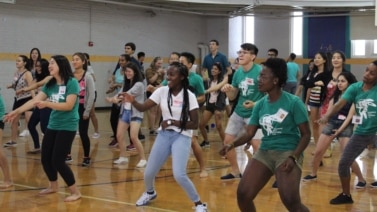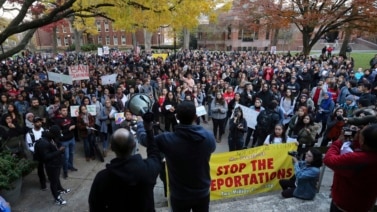New York City is a place full of surprises for many first-time visitors.
Americans and foreigners alike experience a kind of culture shock when they first arrive.
New York is one of the most respected centers of higher education in the United States. Many young people like to live and work in America's largest city. But if you do not know where to start, it helps to belong to a community.
The city has a place where students have a chance to meet, and find their place in the world. It is a private, non-profit center called International House. It serves students from more than 100 countries.
Adjibola Amzat lives there. He is from Nigeria.
“Without the International House, New York would have been a very, very lonely place for many people."
Amzat worked as a news reporter. He left his job to study at Columbia University. He registered for a graduate degree program in journalism.
Amzat likes International House. He thinks it has helped to improve his experience at Columbia University.
“New York is a lonely place. I mean, there are many people around, there is diversity of cultures and ethnicities and all that, but still, people don't mingle…”
Heather Mangum is the director of communications for International House. She has urged students to socialize with other students in the many shared spaces of the building.
“Residents stay in rooms that are by design very small. And that is so that they come out into the common areas, and interact and exchange with each other. The dining room is communal by design, so you can sit with someone new for every meal.”
International House welcomes graduate students from many New York-area universities. They have a chance to attend many cultural celebrations throughout the year.
Many students say their interaction with other students has led to new friendships and personal growth.
Lebogang Mahlare is from South Africa.
“I think the way in which you engage the political discourse when it comes to systemic issues, it was a huge, huge awakening because I never anticipated it would be the case when I arrived. But I could draw on some lessons back home, and so it really informed the conversations that I had with some friends, and it really for me was a great way to plug into a new way of sort of black consciousness.”
Akmyrat Tuyliyev is from Turkmenistan. He says he found people from so many areas at International House. This, he says, made him want to work to change the world.
“I come from a country where we don't have different races. I've never seen a black person until I came to the United States. So seeing students from Russia, students from China, and all of these other countries, coming here to unite, was really inspiring.”
Many of the 700 people who live at International House say they want to continue the relationships they have begun when they return home. And they want to share with their countrymen the leadership skills they have learned in the United States.
I'm Marsha James.
VOA Correspondent Ramon Taylor reported this story from New York. Christopher Jones-Cruise adapted his report for Learning English. George Grow was the editor.
We want to hear from you. Write to us in the Comments Section, or visit our Facebook page.
Words in This Story
graduate degree - adj. of or related to an award given at the completion of a study program at a school of higher education
diversity - n. the condition of having or being made of different parts
mingle - v. to bring or mix together with someone or something else
interact - v. to act upon one another
communal - adj. of or relating to a community
discourse - n. exchange or discussion
awakening - n. recognition of something
plug into - v. to know or receive information about something or to start using new information
consciousness - n. knowledge; mindfulness or observation
inspiring - adj. causing people to want to do something or to lead better lives


